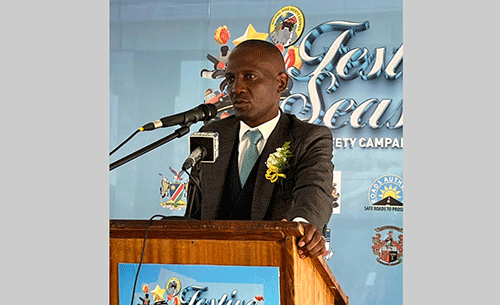Transport minister Veikko Nekundi has directed all traffic law enforcement officers to stop issuing fines to drivers for vehicle-related defects beyond their control.
Instead, vehicle owners, instead of drivers, should take responsibility and fines for defects on their vehicles.
The directive, which came into effect on Monday, mandates that such fines be issued to the vehicle operators or owners, as prescribed by law.
Rising before Parliament on Tuesday, Nekundisa said the new directive aims to restore fairness in the implementation of traffic laws, protect the livelihoods of drivers and reinforce public trust in law enforcement.
“It has come to my attention, through numerous representations from the public, transport associations and especially our hard-working truck drivers, that citations are increasingly being issued for issues that fall entirely outside the legal responsibility of drivers,” Nekundi told the National Assembly.
He cited Section 64 of the Road Traffic and Transport Act, which clearly differentiates between driver duties and operator responsibilities such as vehicle maintenance, loading compliance, documentation and equipment standards.
He added that thousands of drivers, most of whom are employees earning modest wages, have been penalised for vehicle conditions they neither caused nor can fix.
“This practice not only violates the legal framework, but it unjustly burdens the working class,” he said.
Nekundi indicated that the new directive has three key instructions for law enforcement: citations for vehicle defects and non-compliance must be issued to the registered operator or owner, not the driver.
Enforcement must align with the legal responsibilities defined in the Road Traffic and Transport Act, and the approach must be applied consistently across all regions and local authorities.
The directive has already been welcomed by several transport associations and long-haul drivers, who say they have long endured unfair treatment from traffic officers.
“Stakeholders including the Namibian Police, local authorities, road inspectorates, vehicle operators and the driving community have all been engaged to ensure a smooth implementation of the directive,” he said.
He urged all members of Parliament to support the implementation of the directive and help raise awareness in their constituencies.
“Good governance is not only about making laws but ensuring that they are fairly implemented,” Nekundi stated.
Shikongo Petrus, a truck driver for over 12 years, welcomed the directive.
“We have been fined for tyre problems or broken lights when the truck belongs to a company, while we don’t have the authority to fix or replace anything,” he stressed.



